|
|
|
Sort Order |
|
|
|
Items / Page
|
|
|
|
|
|
|
| Srl | Item |
| 1 |
ID:
118003
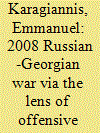

|
|
|
|
|
| Publication |
2013.
|
| Summary/Abstract |
The Russian intervention in Georgia's breakaway republic of South Ossetia in August 2008, Moscow's first-ever use of military force against a sovereign state in the post-cold war period, deserves a theoretical explanation. By following the tenets of Offensive Realism, this article will argue that the US-Russian competition in the South Caucasus is the main cause of the 2008 Russian-Georgian war. During the 1990s, the USA passed the buck to Turkey to contain Russian influence in the South Caucasus. In the early to mid-2000s, however, the Russian-Turkish relations were improved so rapidly that the USA opted, through NATO expansion, to step in as an offshore balancer. Following Bush administration's decision to support the Georgian candidacy for NATO membership and Georgia's ill-fated attempt to seize South Ossetia, Moscow went to war to re-establish hegemony in the South Caucasus. In this way, as the theory of Offensive Realism claims, the Kremlin believes that Russian state will enhance its chances of survival in the anarchical international system.
|
|
|
|
|
|
|
|
|
|
|
|
|
|
|
|
| 2 |
ID:
118002
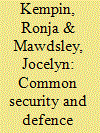

|
|
|
|
|
| Publication |
2013.
|
| Summary/Abstract |
This article argues that rather than being an emancipatory step for the EU, the Common Security and Defence Policy in its current format represents a continuation of US strategic hegemony. Using a neo-Gramscian model of hegemony, by considering both civilian and military aspects of CSDP, the article shows how US ability to export its strategic doctrine to EU member states is undiminished. It argues that respect for US military achievements is a key reason for this, but that this may lead EU states to make poor strategic decisions, which moreover may lack political and public legitimacy.
|
|
|
|
|
|
|
|
|
|
|
|
|
|
|
|
| 3 |
ID:
118001
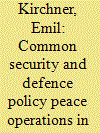

|
|
|
|
|
| Publication |
2013.
|
| Summary/Abstract |
Common Security and Defence Policy (CSDP) missions have increased substantially in number, functions and geographic spread since their inception in 2003. Despite their expansion in numbers and scope, especially in the Western Balkans, few systematic assessments of the contributions that CSDP missions make to peacekeeping and peacebuilding efforts have been undertaken to date. This article addresses that lacuna by assessing the contributions CSDP missions have made in recent years to peacekeeping and peacebuilding in the Western Balkans. It explores whether CSDP missions in that region: make an intrinsic contribution to peacekeeping and peacebuilding in those countries or merely profit (or take credit) from the initial groundwork laid by United Nations (UN) and North Atlantic Treaty Organization (NATO) missions; are adequately coordinated within the European Union (EU) and between the EU and other international organisations, including NATO; are sufficiently embedded or effectively linked to other EU instruments, such as the Stability and Association Process to the Western Balkans; and engender adequate elite or public support or 'ownership' in these countries.
|
|
|
|
|
|
|
|
|
|
|
|
|
|
|
|
| 4 |
ID:
118000


|
|
|
|
|
| Publication |
2013.
|
| Summary/Abstract |
The US billion dollars investments in cyber security are creating a securitisation of cyberspace. What has happened meanwhile in Europe? The argument is threefold. First, cyber threats were raised to the national threat level in Germany (2006), France (2008) and the UK (2008), but the justifications put forward for such an upgrade did not hold, as well as invested resources at that point in time. Second, cyber security strategy followed up this upgrade and designed a framework to tackle the threat that was found coherent with the assessment of the respective national security strategies. Third, cyber insecurity stemmed from criminals operating in cyberspace. Therefore, deterring criminals should have been at the core of tackling cyber insecurity but the defence strategies of France, Germany and the UK were instead focused on mitigating the effects of cyber attacks.
|
|
|
|
|
|
|
|
|
|
|
|
|
|
|
|
| 5 |
ID:
118004
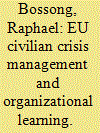

|
|
|
|
|
| Publication |
2013.
|
| Summary/Abstract |
Commentators and policy-makers stress the need to learn the lessons of EU civilian crisis management. Yet despite numerous case studies on mission performance, we know little about the EU's overall capacity for such learning. The first part of this article outlines a theoretical framework for analyzing organizational learning in the context of peace operations. It recommends focusing on administrative reform and conceptual development in Brussels, and lists various factors that are expected to facilitate or inhibit organizational learning cycles. On this basis, the second part presents a historical survey of the EU's learning efforts in civilian crisis management. Despite a dynamic expansion of mission tasks as well as corresponding review processes, organizational learning has remained haphazard and limited to capacity expansion or mission support requirements. Only since 2009 did the EU invest in more formalized lessons-learning processes, which led to more systematic information gathering and more in-depth conceptual discussions. So far, however, these initiatives could not overcome political constraints to more ambitious reforms of EU peace operations.
|
|
|
|
|
|
|
|
|
|
|
|
|
|
|
|
| 6 |
ID:
117999


|
|
|
|
|
| Publication |
2013.
|
| Summary/Abstract |
By creating the European Gendarmerie Force (EGF), some European Union (EU) member states have devised a 'structured solution' to provide international civilian police capabilities. In this article, we undertake a critical examination of the EGF by first arguing that the EGF has been widely misrepresented, notably with regard to its general purpose and specific relationship to the EU. Next, we examine a range of security problems used to justify the EGF, arguing that its potential role in handling certain tasks has not been very carefully considered. Finally, we suggest that a major rationale behind the EGF was the shared desire among its members to draw attention to a policing model that is not universally appreciated, and to promote this model by offering its 'third-type' capabilities while keeping the EGF outside of EU institutional constraints. In the conclusion, we identify some crucial questions related to the EGF-EU relations, notably in terms of non-optimisation of EU resources and possible incoherence in EU/Common Security and Defence Policy efforts.
|
|
|
|
|
|
|
|
|
|
|
|
|
|
|
|
| 7 |
ID:
118006
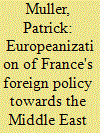

|
|
|
|
|
| Publication |
2013.
|
| Summary/Abstract |
France's prominent role in Europe's policy towards the Arab-Israeli conflict represents an interesting case study for the evolving research on Europeanization. While France's involvement in the CFSP is frequently described as a case of national projection through the EU, this view needs qualification. Proposing a novel conceptual categorization of different member state approaches to European foreign policy cooperation, this article shows that France's involvement in Europe's Middle East policy has gone through different phases. Guided by de Gaulle's politique arabe, France assumed a 'leadership' role in Europe's common foreign policy, leaving a strong mark on its collective diplomacy. Since the 1990s, however, a number of complementary changes have weakened France's capacity for leadership, challenging well-established French foreign policy positions. France's response to the mounting constraints of EU-level cooperation has oscillated between 're-nationalization' and efforts to 'facilitate' a common European approach, displaying a considerable degree of pragmatism and tactical adaptation.
|
|
|
|
|
|
|
|
|
|
|
|
|
|
|
|
|
|
|
|
|